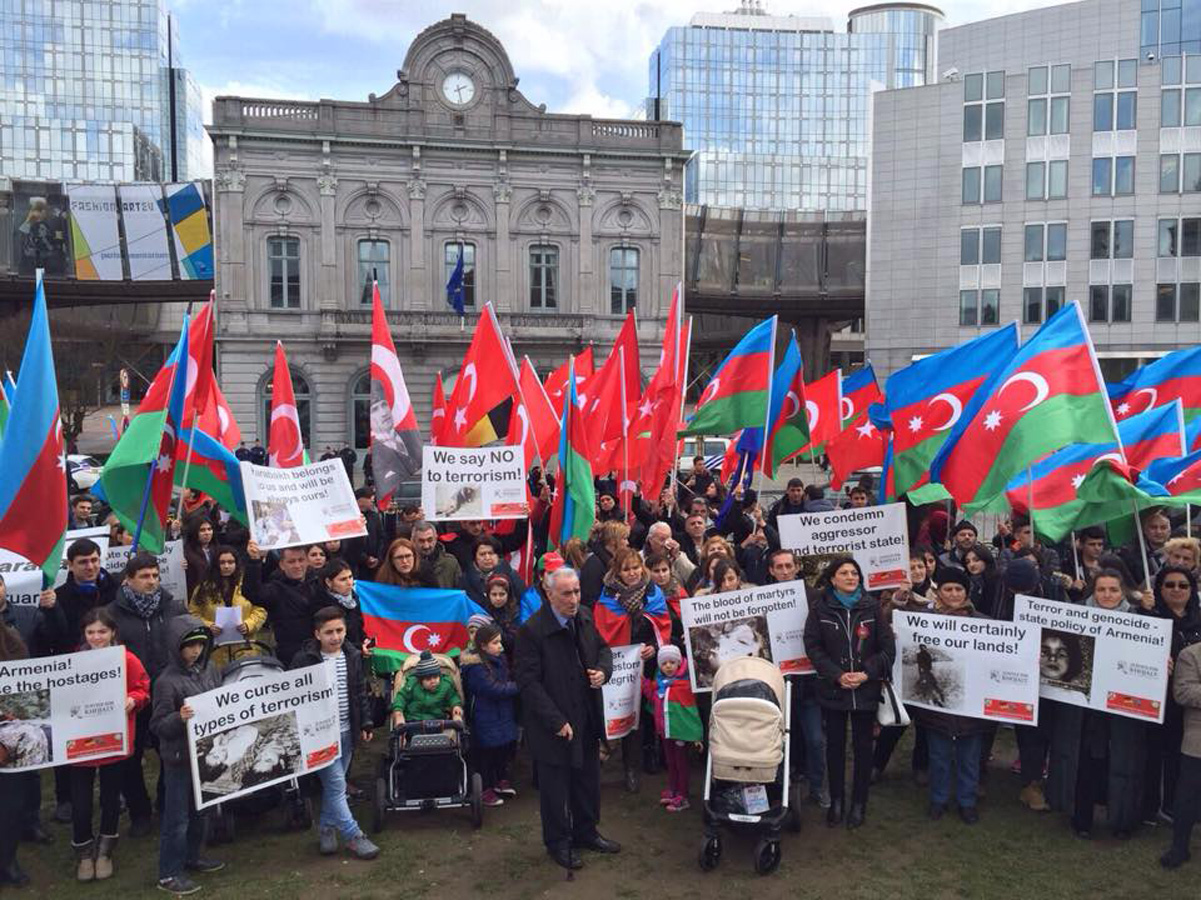Azerbaijani, Turkish diaspora stage protest in Brussels

The representatives of the diaspora organizations of Azerbaijan and Turkey in Europe held a protest in Brussels, Belgium, timed to coincide with March 31 - Day of Genocide of Azerbaijanis.
The committee said the protest was aimed to inform the European public of the acts of genocide and terror committed by Armenians against Azerbaijanis and Turks at different stages of the history, to protest against Armenians’ “genocide” claims, Armenia’s military aggression against Azerbaijan, as well as the Khojaly genocide, the Azerbaijani State Committee for Work with Diaspora reported.
The rally was organized by Benelux Azerbaijanis Congress (BAC) with the support of European Azerbaijanis Congress (EAC), The Bielefeld NRW German-Azerbaijani Culture Society, Hanover Caspian Society, Azerbaijani-Belgian Friendship Society. The representatives of Ana Vatan Europe-Azerbaijan Women Society, Odlar Yurdu Society took an active part in the protest action. Over 400 representatives of the Azerbaijani and Turkish diasporas participated in a two-hour action.
The protesters first gathered at the Place du Luxembourg in Brussels in front of the European Parliament. The moderator of the action, the first vice-president of Benelux Azerbaijanis Congress Elsever Mammadov, spoke about the aims of the event.
Then the head of the Benelux Azerbaijanis Congress, Sahil Gasimov, president of the Congress of European Azerbaijanis Samira Patzer-Ismayilova, head of the Bielefeld branch of the Ataturk Thought Association Mehmet Ali Olmez, and chairman of the Caspian Society of Hannover Etibar Ganiyev urged the world community to unite in the fight against the common evil of mankind - terrorism.
“The rally continued in front of the Armenian embassy in Brussels,” the committee reported. “Faiq Mammadov, member of the Bielefeld German-Azerbaijani Cultural Society, addressed on behalf of the protesters. Mammadov stressed that the occupation policy of Armenia threatens peace and stability in the region and caused the deaths of tens of thousands of people.”
Head of 'Ana Vatan' Association of Azerbaijani Women Maisa Agamirzayeva read out the statement adopted by the protestors. In this statement, the authors protest the recognition of the 1915 events as “Armenian genocide”, adding that genocide was committed against Turks of Anatolia and South Caucasus.
The authors also touched upon Armenian aggression against Azerbaijan, as well as the Khojaly genocide. The authors of the document demand from other countries to support the process of peaceful settlement of the Nagorno-Karabakh conflict, put an end to the policy of aggression and terror pursued by Armenia.
As a result of a deliberate policy of ethnic cleansing, genocide and deportation of Azerbaijanis, pursued in the last two centuries by Armenian nationalists and their supporters, Azerbaijani people faced severe challenges.
This policy even more intensified in 1918-1920. The genocide was committed on March 31, 1918, when hundreds of towns and villages of Azerbaijan were destroyed, as well as 150 Azerbaijani villages in Karabakh were turned to ruin, an unprecedented bloodshed in Shusha was committed.
More than 700,000 Azerbaijanis, including 30,000 people in Baku and in surrounding villages were brutally murdered, mosques and schools were burned down.
The conflict between the two South Caucasus countries began in 1988 when Armenia made territorial claims against Azerbaijan. As a result of the ensuing war, in 1992 Armenian armed forces occupied 20 percent of Azerbaijan, including the Nagorno-Karabakh region and seven surrounding districts.
--
Follow us on Twitter @AzerNewsAz
Here we are to serve you with news right now. It does not cost much, but worth your attention.
Choose to support open, independent, quality journalism and subscribe on a monthly basis.
By subscribing to our online newspaper, you can have full digital access to all news, analysis, and much more.
You can also follow AzerNEWS on Twitter @AzerNewsAz or Facebook @AzerNewsNewspaper
Thank you!
